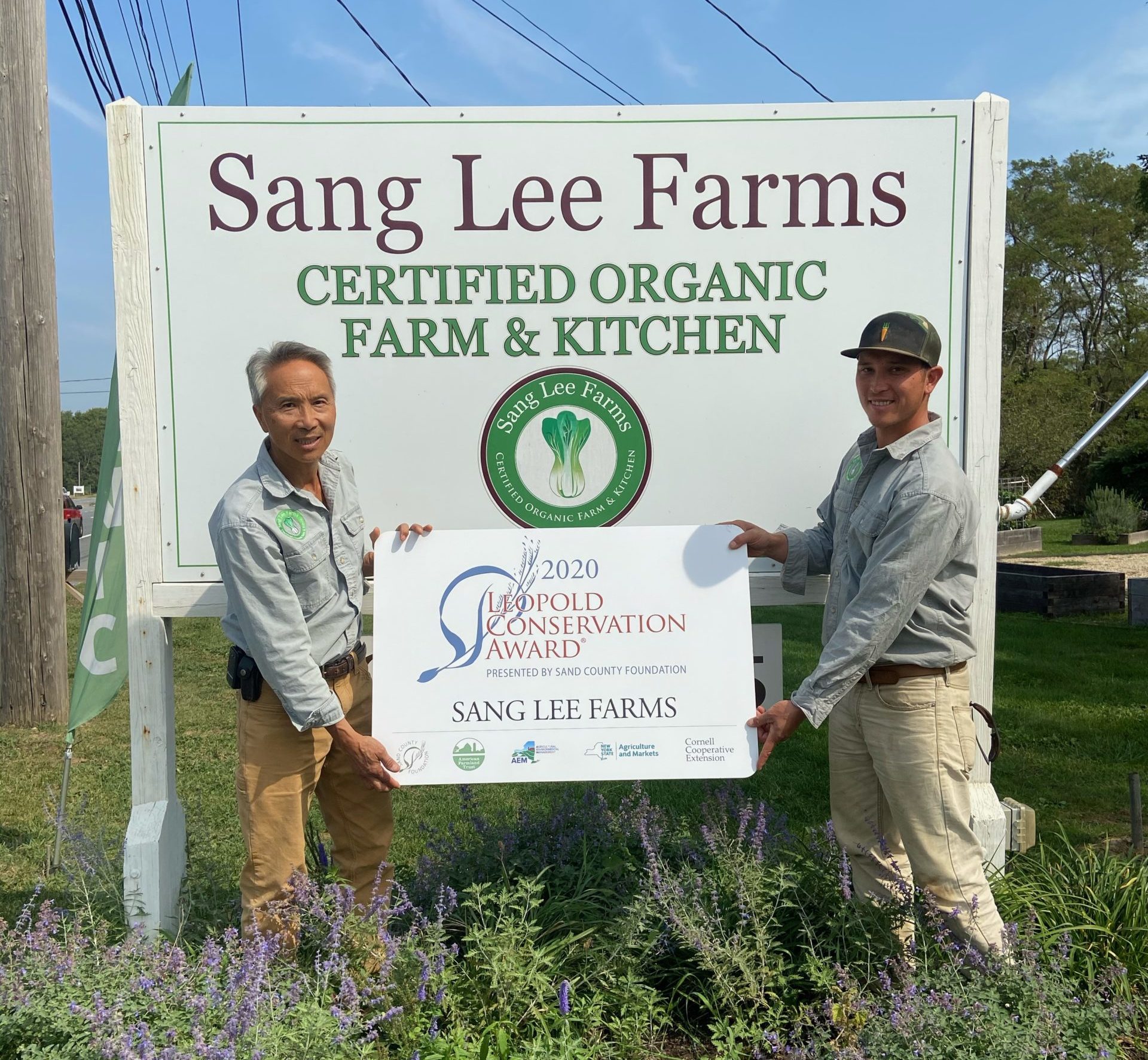Sang Lee Farms Recognized for Environmental Stewardship


Sang Lee Farms, a certified organic farm in Peconic on the North Fork, has been selected for the inaugural AEM-Leopold Conservation Award because the farmers there are “real life examples of conservation-minded agriculture.”
Sang Lee, one of Suffolk County’s largest vegetable farms, is owned and operated by father and son, Fred and William Lee. They grow more than 100 varieties of specialty fruit and vegetables on 97 acres, where they use modern technology and environmental best practices, such as annual crop rotation to assist with pest management, and inter-seeding of cover crops to suppress weeds, increase soil fertility and to protect and conserve water resources.
The award is bestowed by the Sand County Foundation, a national nonprofit conservation organization, first created in 1967 to protect the land surrounding the famous “Shack” property of Aldo Leopold, known to be America’s foremost conservation thinker. In 1949, Leopold wrote, “A Sand County Almanac,” introducing conservation ideas and the notion of individual responsibility for private land management, while recognizing that a landowner’s profitability and economic growth are tied to conservation success. The Sand County Foundation continues to help landowners and farmers to ethically manage the natural resources in their care.
Kevin McAleese, the Sand County Foundation president and chief executive officer said, “Recipients of this award are real life examples of conservation-minded agriculture. These hard-working families are essential to our environment, food system and rural economy.”
New York’s longstanding Agricultural Environmental Management (AEM) Award joined with the nationally-recognized Leopold Conservation Award program. In partnership with the New York State Department of Agriculture and Markets, the AEM-LCA award honors Sang Lee Farms for its efforts to protect the environment through the preservation of soil and water quality while ensuring farm viability for future generations.
Earlier this year, New York State Soil and Water Conservation Districts were asked to nominate “the best examples of conservation success in their district,” and applications were reviewed by an independent panel of agricultural and conservation leaders.
“On behalf of the Department and New York State, I congratulate Sang Lee Farms on receiving this esteemed award,” said NYS Agriculture Commissioner Richard A. Ball. “The Lees have long been dedicated to caring for the environment, educating their Long Island neighbors about their work to grow healthy, fresh food, and giving back to their community. They have prioritized the conservation of the land, water and our wildlife to not only ensure the long-term viability of the farm but also to protect our natural resources for our future generations.”
William Lee said he and the rest of the team at Sang Lee are committed stewards of the environment, which has been strengthened by the award, given during one of the mot challenging seasons. “We are pleased to carry the AEM Leopold Conservation Award torch this year and we will continue to manage our farmland and natural resources to the best of our ability for years to come. We hope that by joining this network of innovative farmers we can continue to learn and teach environmentally conscious food production practices to improve our long-term sustainability and local community health.”
For more than 70 years, the Lees have incorporated conservation practices into their farming operations, which began elsewhere on Long Island when Fred Lee’s father and uncles began raising produce to supply New York City’s Chinatown in the 1940s. He set up operations in Peconic in 1987.
The business is in the midst of transitioning from Fred Lee to his son. The Lees sell their produce and cut flowers at local farmers markets, a Community Supported Agriculture program, at their own farm stand, and online. They have an on-site, certified organic kitchen, where a line of Sang Lee Farms dressings, dips, pestos, jellies, pickles, cooking sauces, prepared salads, vegan soups, and fermented vegetables are sold.
The farm also donates to local food pantries and hosts field days to demonstrate the benefits of reduced tillage and composting.



